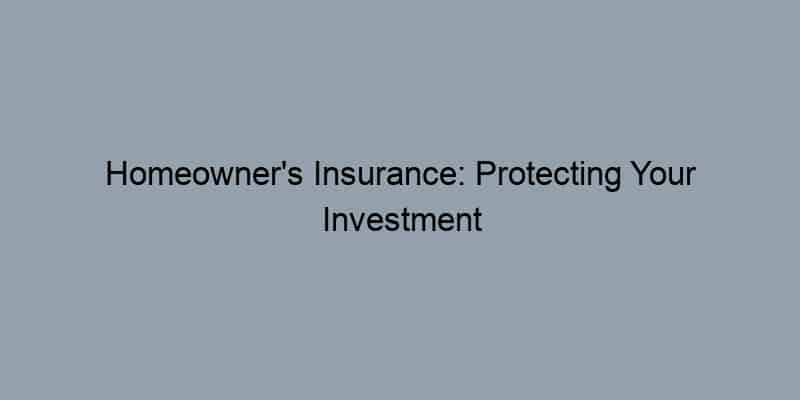In a world filled with uncertainties, your home stands as a fortress—your safe haven amidst the chaos. But what happens if that sanctuary faces unexpected threats? Enter homeowner’s insurance, an essential fortress for your financial investment. This article dives deep into the importance of homeowner’s insurance, guiding you to protect your castle and everything in it.
What Is Homeowner’s Insurance?
Homeowner’s insurance is a policy that protects you from financial losses due to damage to your home or personal property. This insurance typically covers various risks, including fire, theft, vandalism, and certain natural disasters. Beyond protecting the physical structure of your home, it can also provide liability coverage in case someone is injured on your property.
Why Do You Need Homeowner’s Insurance?
-
Protect Against Financial Loss: Imagine coming home to find your entire house engulfed in flames. Without insurance, you would have to bear the financial burden of rebuilding from scratch. With homeowner’s insurance, you can rest easy knowing you’ve got a safety net.
-
Investment Protection: Your home is likely one of the most significant investments you will ever make. Regular maintenance is necessary, but you can’t predict every catastrophe. Homeowner’s insurance ensures that your investment remains intact, even in the face of adversity.
-
Liability Coverage: Accidents happen. A guest trips over a loose rug and injures themselves. Without adequate insurance, you could face lawsuits and the resulting financial liabilities that could lead to financial ruin. Liability coverage under your homeowner’s insurance offers protection against legal claims resulting from such incidents.
-
Peace of Mind: Knowing that you are protected provides mental ease. You’ll have fewer sleepless nights worrying about what might happen, allowing you to focus on creating beautiful memories in your home.
What Does Homeowner’s Insurance Cover?
When you purchase homeowner’s insurance, it’s crucial to understand what types of coverage you actually get. While policies differ, here’s a rundown of common types of coverage:
-
Dwelling Coverage: This covers the structure of your home.
-
Personal Property Coverage: Your belongings, including furniture, electronics, and clothing, are covered here.
-
Liability Protection: If someone gets injured on your property, this protects you against the financial fallout.
-
Medical Payments: Covers medical expenses for guests who are injured on your property, regardless of fault.
-
Additional Living Expenses (ALE): If your home becomes unlivable due to covered damages, this part of the policy provides funds for temporary living arrangements.
Types of Homeowner’s Insurance Policies
-
HO-1: Basic Form – Offers minimal coverage for specific disasters.
-
HO-2: Broad Form – Offers coverage for a broader range of disasters.
-
HO-3: Special Form – The most common type, covering all perils unless specifically excluded.
-
HO-4: Renter’s Insurance – Designed for tenants, covering personal property and liability but not the structure.
-
HO-5: Comprehensive Form – Offers extensive coverage for homes and personal property, including newer homes.
-
HO-6: Condo Insurance – For condominium owners, covering personal property and parts of the building.
-
HO-7: Mobile Home Insurance – Specifically for mobile or manufactured homes.
How to Choose the Right Policy
Choosing the right homeowner’s insurance can be daunting. Here are some tips to simplify the process:
-
Evaluate Your Needs: Consider the size of your home, the value of your belongings, and the risk factors in your area.
-
Get Multiple Quotes: Don’t settle for the first quote you receive. Comparing offers allows you to find the best deal.
-
Understand Exclusions: Every policy has exclusions. If you live in an area prone to flooding, find a policy that offers flood coverage.
-
Increase Your Deductible: A higher deductible will lower your premium, but ensure you can afford the expense in case of a claim.
-
Review Annually: As your life changes, so can your insurance needs. Review your policy every year and make necessary adjustments.
Homeowner’s Insurance Myths
Despite the importance of homeowner’s insurance, many misconceptions persist. Here are a couple of myths debunked:
-
Myth 1: “My homeowner’s insurance covers everything.”
Fact: Not all disasters are covered. Understand your policy to know your coverage. -
Myth 2: “Homeowner’s insurance is unaffordable.”
Fact: By comparing quotes and making informed choices, you can find coverage that fits your budget.
FAQs
Q: How much homeowner’s insurance do I need?
A: The amount of insurance depends on the value of your home and personal property, individuals usually opt for enough coverage to rebuild the home and cover personal belongings.
Q: Will homeowner’s insurance cover natural disasters?
A: It depends on the type of disaster. Standard policies may cover fire and theft but not flood or earthquake damage. Additional coverage can usually be purchased for these perils.
Q: How can I lower my homeowner’s insurance premium?
A: There are several ways to lower your premium, such as raising your deductible, bundling policies, and making your home safer (adding security systems, modernizing wiring, etc.).
Q: Can I choose my contractor for repairs after a claim?
A: Generally, you can choose your contractor, but your insurance company may recommend pre-approved contractors.
Q: Do I need insurance if I own my home outright?
A: While it’s not legally required, it’s highly advisable to protect your investment.
Conclusion
Homeowner’s insurance is not just a bill you pay; it’s an investment in your peace of mind and financial security. Whether you’re protecting against fire, theft, or liability claims, this insurance serves as your protective shield against the unforeseen. As you navigate the complex world of homeowner’s insurance, remember that knowledge is power.
Don’t forget, if you’re looking to make informed decisions about your property, you can access valuable information through OfficialPropertyRecords.org, where you can obtain free property records. This knowledge can aid you in understanding your home’s value, history, and insurance needs, making your journey towards securing your investment a seamless road to peace of mind.

